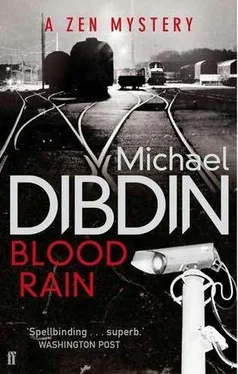Michael Dibdin - Blood rain
Здесь есть возможность читать онлайн «Michael Dibdin - Blood rain» весь текст электронной книги совершенно бесплатно (целиком полную версию без сокращений). В некоторых случаях можно слушать аудио, скачать через торрент в формате fb2 и присутствует краткое содержание. Жанр: Полицейский детектив, на английском языке. Описание произведения, (предисловие) а так же отзывы посетителей доступны на портале библиотеки ЛибКат.
- Название:Blood rain
- Автор:
- Жанр:
- Год:неизвестен
- ISBN:нет данных
- Рейтинг книги:3 / 5. Голосов: 1
-
Избранное:Добавить в избранное
- Отзывы:
-
Ваша оценка:
- 60
- 1
- 2
- 3
- 4
- 5
Blood rain: краткое содержание, описание и аннотация
Предлагаем к чтению аннотацию, описание, краткое содержание или предисловие (зависит от того, что написал сам автор книги «Blood rain»). Если вы не нашли необходимую информацию о книге — напишите в комментариях, мы постараемся отыскать её.
Blood rain — читать онлайн бесплатно полную книгу (весь текст) целиком
Ниже представлен текст книги, разбитый по страницам. Система сохранения места последней прочитанной страницы, позволяет с удобством читать онлайн бесплатно книгу «Blood rain», без необходимости каждый раз заново искать на чём Вы остановились. Поставьте закладку, и сможете в любой момент перейти на страницу, на которой закончили чтение.
Интервал:
Закладка:
Almost every aspect of this cover story had turned out to be untrue. For a start, the new ‘elite corps’ did not exist, or rather it existed already in the form of the Direzione Investigated Anti-Mafia, set up in 1995 by Judge Giovanni Falcone with the collaboration of the then Minister of Justice, Claudio Martelli. Aurelio Zen had not been invited to join this group, and not surprisingly, since it consisted of young, keen, energetic volunteers from the country’s three separate police forces. Nevertheless, he was being posted to Sicily, he had learned shortly after his return to Rome following the false close he had achieved in the Vincenzo affair. In what role, however, remained for the moment ambiguous.
‘Essentially, you’re to act as a facilitator,’ Zen’s immediate superior had told him before his departure from Rome. ‘Needless to say, the DIA are doing admirable work, on the whole. Nevertheless, there is a growing feeling abroad that, like every elite division, they sometimes exhibit a regrettable and perhaps potentially perilous tendency towards a… How shall I put it? A degree of professional myopia. There have been instances, some quite recently, when they have regretfully been perceived to be acting without due consultation, and in apparent ignorance of the wider issues involved.’
The official paused, awaiting Zen’s response. At length, realizing that it would not be forthcoming, he continued.
‘With the aforesaid factors in mind, a decision has been made at ministerial level to deploy a pool of mature and experienced officials such as yourself to liaise directly with members of the Polizia Statale seconded to the DIA. Your role will be firstly to report to us here at the Viminale on the nature and scope of DIA initiatives, both current and planned, secondly to monitor the response of all local personnel to ensuing governmental directives, and thirdly to communicate these in turn to Rome, all with a view to expediting an efficient and unproblematic implementation of official policy Do you understand?’
Zen understood only too well: he was being asked to act as a spy. The position of Head of Post in each DIA office was allocated in turn to a representative of one of the police forces involved, each responsible to a different ministry in Rome: Defence, Finance, or Interior. The novelty of the DIA was that it had been set up from the first as a cooperative venture involving all three forces, and had been specifically designed to function independently of any ministerial interference.
At the time, in the wake of the bloodbath initiated by the Corleone clan, and the killings of General Dalla Chiesa and the judges Falcone and Borsellino, it would have been politically unthinkable for any interested party to try to limit or control that independence. But times had changed. The Mafia had apparently been broken, with all but a few of its top capi jailed or in hiding, and there had been no large-scale outbreaks of violence for several years. Clearly someone in Rome, possibly several people, felt that the moment was now propitious to rein in this too-efficient and semi-autonomous organization. Even the public seemed to be starting to feel that enough was enough. Where would it all end? Were we to bring back the Inquisition?
It was in this new climate of covert consensus that Aurelio Zen had been sent south, and not to Syracuse but to Catania, the island’s second-largest city and a stronghold of various Mafia clans who had long resented the power, fame and influence of their rivals — and sometimes uneasy allies — in Palermo. The office of the DIA responsible for the provincia di Catania was presently commanded by a colonel of the paramilitary Carabinieri, whose ultimate loyalties — in the event of any inter-ministerial disputes — lay with his superiors at the Ministry of Defence. The new political appointees at the rival Interior Ministry wanted their own man on the spot, and Aurelio Zen — unambitious and deeply compromised — had been their choice.
Superficially, Zen had to admit, it was not a bad job. Every week, each DIA office submitted a strictly confidential report on its current activities to headquarters in Rome. Thanks to a highly placed contact there, copies of these were passed to the Interior Ministry on the Viminale hill — as well, no doubt, as to the other two interested ministries. On the following Monday, a transcript of that portion of the report pertaining to the province of Catania turned up on Zen’s desk. His official title was Liaison Officer, and he supposedly functioned as a sort of surrogate uncle dispatched by the new, ‘caring’ ministry in Rome. His real job was to amplify and amend the extract from the DIA’s bare-bones document in the course of casual conversation with the seven officers of the Polizia Statale on the local DIA roster.
He took them out for a coffee, a beer, even a meal, ostensibly to discuss their personal problems and keep them informed about pension plans, medical benefits, alternative career openings and the like. Then, at a certain point, he would let drop one of the facts garnered from his perusal of the previous week’s DIA report, in a manner which suggested that he respected his younger colleagues for doing such important and dangerous work and would be interested in knowing further details. These were generally forthcoming. Like anyone else, Zen’s contacts loved to chat, bitch and gossip about their work, except that in their case this was impossible, stuck as they were deep in enemy territory. But here was a senior officer in their own force, a man of wisdom and discretion hand-picked by the authorities in Rome to look after their personal and professional well-being. If they couldn’t trust him, whom could they trust?
Today, Zen was lunching with Baccio Sinico, an inspector in his early thirties who had been in Sicily for almost three years, first in Trapani and then Catania, and now wanted to be transferred back to his native Bologna. This put Zen in an even more awkward position than usual. Sinico’s request was perfectly in order, and would already have been approved if it had not been for Zen’s intervention. Of all his contacts inside the DIA, Sinico had turned out to be by far the most informative and uninhibited, and Zen didn’t want to lose him. At the same time, he completely understood and sympathized with the man’s wish to return home.
It wasn’t so much a question of the physical danger, he had realized, although this was real enough. But in the course of their conversations Zen had sensed that Sinico was afflicted by another complaint, at once vaguer and more disturbing. Although Sicily was part of Italy and therefore of Europe, it didn’t feel like it. In everything one did, saw and heard, there was a sense of being cut off from the mainstream, from il continente, as Sicilians termed the mainland. The result was a peculiarly insular arrogance, a natural reaction to centuries of being either ignored or exploited by whoever happened to be in power in the places that mattered.
Baccio Sinico was suffering from a reaction to this mentality, as perhaps was Zen himself, on those not infrequent mornings when he woke at three or four in his darkened apartment for no apparent reason and found it impossible to seduce sleep again. This will end badly, he thought, standing at the open window, the smoke from his cigarette wafting gently away on the sea breeze which came by night to mitigate the rigours of the southern sun. All was balmy, all was calm, but an ancient instinct buried deep within his cortex refused to be fooled. This will end badly, it told him, with all the authority of a source at once disinterested and well-informed. This will end badly.
Her journey to work seemed, as always, a crude parody of her entire existence: a cartoon-strip version, at once focusing and parodying the life she now lived.
Читать дальшеИнтервал:
Закладка:
Похожие книги на «Blood rain»
Представляем Вашему вниманию похожие книги на «Blood rain» списком для выбора. Мы отобрали схожую по названию и смыслу литературу в надежде предоставить читателям больше вариантов отыскать новые, интересные, ещё непрочитанные произведения.
Обсуждение, отзывы о книге «Blood rain» и просто собственные мнения читателей. Оставьте ваши комментарии, напишите, что Вы думаете о произведении, его смысле или главных героях. Укажите что конкретно понравилось, а что нет, и почему Вы так считаете.











